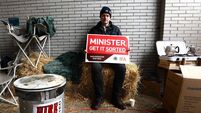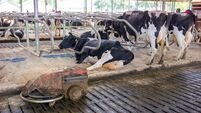High profits, high tax: Why 2025 could catch farmers out

The time lag between when profits are earned and when tax gets paid can lead to farmers getting caught offside.
This year is shaping up to be a year of strong profits for beef, dairy and sheep sectors and it's great farmers can feel they are being rewarded well for the invaluable work they do.
The sting in the tail is that higher farm profits usually result in higher income tax liabilities, but the tax liabilities don’t usually manifest themselves until the following year.
The time lag between when profits are earned and when tax gets paid can lead to farmers getting caught offside.
Many farmers have first-hand experience of that situation in 2023. The previous year, 2022, was a year of record profits, and 2023 saw a significant drop in income which deteriorated as the year progressed, as a result of increasing input costs, especially fertiliser, fuel and energy bills, while output prices tailed off.
In the absence of a strong helping of financial discipline, many farmers spent their 2022 profits on clearing down creditors or making on-farm capital improvements in buildings or machinery.
Unfortunately, there is no tax deduction going for clearing down creditors (as the tax deduction is given at the point of incurring the bill rather than the point of paying the bill) and the tax deduction for building works or machinery is spread over seven or eight years.
As 2025 is shaping up to be a year of strong profits again, farmers are rightly wondering where their profits can be spent in order to reduce their exposure to income tax. The factors to be considered in determining whether an expense is revenue or capital include whether the expenditure results in an enduring benefit for the trade.
Capital expenses such as building sheds or putting in new farm roadways or buying machinery does not have a meaningful impact on a farmer's tax bill as the tax deduction is spread over years rather than being allowable against the current year's profits.
Some capital expenditure has enhanced allowances. allowing for a write-off over one or two years year. This includes energy efficient equipment such as solar panels and other SEAI-approved equipment (variable speed motors, etc), and farmers may wish to consider such expenditure in a year of strong profits to have maximum tax benefits over the shortest possible time.
Certain farm construction works can qualify for allowances to be granted over a two-year period rather than a seven-year period. This relatively new tax relief, introduced in 2023, provides for a scheme of accelerated capital allowances on slurry storage facilities by a person carrying on a trade of farming.
This will allow for qualifying capital expenditure incurred on the construction of slurry storage buildings and associated equipment — this includes floors and walls of animal housing, mass concrete tanks with roof or cover, precast concrete tanks with roof or cover, circular slurry stores with roof or cover, geo-membrane lined stores with roof or cover, slurry aeration systems, and automatic slurry scrapers.
In all cases, the works must be to a standard per Department of Agriculture specifications to qualify for the enhanced write-off.
Leasing farm machinery, as opposed to buying outright or via hire purchase will give a faster write-off for tax purposes — the tax deduction is granted over the term of the lease, but there can be unintended consequences with leases, particularly where there is a trade-in involved or where the asset being acquired is not vatable. Farmers should get detailed advice on whether leasing would be of benefit to their specific circumstances.
Other options available to farmers to lessen the burden of the dreaded tax bills that may arise from 2025 is to consider paying preliminary tax in 2025 for calendar year 2026 to lessen the blow when it comes to filing the tax return next year, or consider making pension contributions — options are available to make preliminary tax payments in a lump sum or by monthly direct debit.
Yet more farmers may wish to consider incorporating their farming business by establishing their own farming company, switching over from a sole trader or partnership, as the case may be.
Each strategy to help minimise the tax hit is specific to the taxpayer and having a plan in place is well worth while. It is worth taking some time to consult with your accountant or tax adviser rather than spending first and regretting the expenditure does not give the tax deduction you were hoping for.












